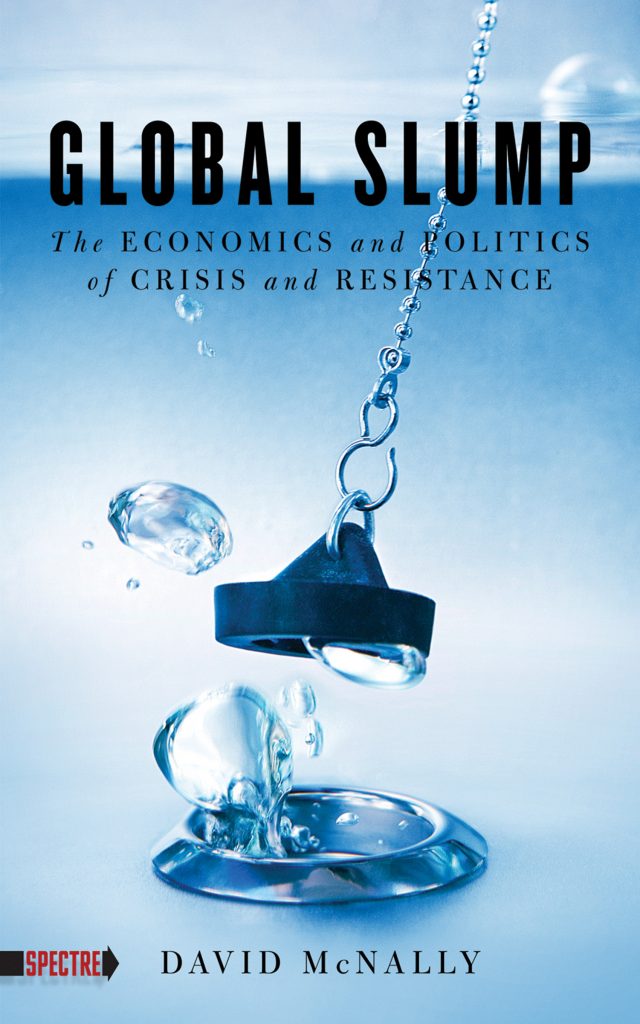By Sarah Laslett
Labor Studies Journal 37(1): 127–140
David McNally’s book Global Slump: The Economics and Politics of Crisis and Resistance provides
an historically grounded and insightful analysis of the economic crash
of 2008. The book would be appropriate for use in an undergraduate or
graduate-level political economy class. It could also be useful for
labor educators preparing popular economics workshops, although it would
not be appropriate to assign to audiences without any higher education
background.
McNally paints a picture of global capitalism and the
impact of recurring economic crises in both the global north and the
global south, in both highly developed economies and developing
economies, and connects the radical swings of economic fortune to both
governmental policy and people’s movements. One particularly powerful
lesson of the book is that the “recovery” of global financial
institutions does not mean improvement in the lives of the average
working person, nor that the sacrifice is equally shared among the
international working class:
While banks and multinationals have
been rescued, there is no bailout for working class people, who can only
expect more “pain” for years and years to come. As corporate profits
recover, jobs, incomes and social services continue to disappear. . . .
But the human recession hits some a lot more than others (24).
Moreover,
McNally assures us at the end of the book that the continued pain for
working people is not a random by-product of the “jobless recovery,” but
rather a strategy of the “shock doctrine”:
“Shock doctrine”
refers to the idea that our rulers cannot carry through radical
neoliberal restructuring without first traumatizing the population.
Massive attacks on pensions, health-care, education, public sector job
and incomes, and on people’s image of the sort of life they ought to
expect—none of this can be accomplished without generating a profound
sense of social crisis, a panic that life as we know it is now imperiled
(184).
While explaining the brutality of the global economic
collapse, and tracing the history of these vicious boom-and-bust cycles
over the last forty years, McNally also wants to inspire us to believe
that a new kind of social justice movement is possible in response. The
final chapter of the book does, indeed, offer inspiring examples, from
the fight against the privatization of water in Cochabamba, Bolivia, to
the factory occupation at Republic Windows and Doors in Chicago.
There
is, however, something of a disconnect between McNally’s macro-economic
analysis and his activist response. One of the things I have been
particularly struck by as I have watched the drama of our current “great
recession” unfold is the anthropomorphizing of the “market.” How often
have we heard that “the market is lacking confidence” or “the market is
having a bad day”? While I have had a number of good chuckles at these
ludicrous analogies, they also strike me as highly dangerous. Just as we
are entering into a movement phase in which the 99 percent are
unveiling the lie behind the idea that corporations are people, we
continue, even in the most progressive of economic analyses, to assign
near-human status to the mythological entity of “the market.” McNally
falls into this trap. In analyzing macro-economic and structural forces,
he even goes so far as to let individual decision makers entirely off
the hook:
But the story of powerful bankers seizing the reins of
capitalism and remaking it in their interests is decidedly unhelpful.
Among other things, it falls prey to the illusion that powerful men (and
the odd woman) actually direct the way our society develops (87).
McNally
wants us to believe that structural forces overwhelm the agency of
individuals in the power structure, as if “the market” can “have a bad
day” without lots and lots of individuals making choices that create
those conditions. And yet we are to also believe that the agency of
activists in building movements to resist exploitation is paramount. How
can, on the one hand, activist agency be a driving force in the
creation of social movements, but on the other, the culpability of
individuals in the financial sector not be an integral part of
understanding how our economy works in the interest of the few?







